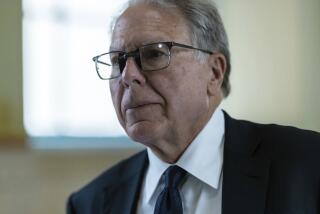Board Quietly Elects NRA Leaders : Convention: Gun fanciers who wanted a leadership shakeup to counter legislative setbacks were disappointed. The embattled CEO was reelected unanimously.
- Share via
ANAHEIM — Despite rumblings of a possible shakeup after one of the worst years in its history, the National Rifle Assn.’s board of directors offered no surprises Monday in its annual leadership elections as the gun lobby’s convention here neared its end.
Among those supported by the board was J. Warren Cassidy, the embattled chief executive officer who has been blamed by some among the NRA rank and file for the group’s recent string of legislative losses at the state and federal levels.
At a raucous general membership meeting here Saturday attended by about 1,000 members, several vocal critics called for Cassidy’s firing, claiming that he has helped turn the NRA into a “paper tiger.”
Internal critics charged that Cassidy has been too willing to appease gun-control activists and to compromise gun owners’ rights. And the full body passed a non-binding resolution seeking to effectively shift power from Cassidy to the head of the NRA’s lobbying arm.
But at Monday’s meeting of the 75-member board, which sets NRA policy, directors reappointed Cassidy by a unanimous voice vote as their executive vice president and top staff officer, a post he has held since 1986. There was no discussion.
“That’s precisely what we were afraid of,” complained Manuel Fernandez of Sepulveda, one of the internal NRA critics. “We wanted a new person with a less compromising position, but (the board) is an old boys’ club.”
Indeed, the board members adopted a business-as-usual demeanor Monday, with virtually none of the hostilities that marked the weekend meeting of the full NRA. The board concludes its two days of meetings today, winding down a six-day convention that drew an estimated 20,000 gun enthusiasts into Anaheim for a gun show, seminars and rallies.
Directors discussed ways of getting more women and minorities into their ranks after a membership drop of 250,000 in the last four years, as well as trying to win over law-enforcement leaders who have become their chief foes on gun-control issues.
But the NRA leaders signaled no dramatic changes in policy or strategies--with the exception of a private satellite network that they are planning to use to link NRA members around the country.
As expected, first vice president Richard Riley of New Hampshire ascended to the presidency of the 2.8-million-member group without opposition. In the view of some members, Riley offers the prospect of more aggressive leadership and a renewed attention to legislative lobbying--once the strong suit of the NRA but now threatened by the recent losses.
There have, in fact, been concerns among some NRA members that Riley might devote too much attention to battling gun-control legislation at the expense of other group interests, such as the hunting, gun safety and shooting programs. Riley confronted that concern in his acceptance speech Monday, saying: “I assure you that nothing could be further from the truth.”
Riley replaces outgoing president Joe Foss, a war hero, former governor of South Dakota and commissioner of the old American Football League, who finished a two-year term.
A colorful and popular figure, the 75-year-old Foss pledged to continue to spread the “doctrine” of the NRA as a director.
Pointing to an unprecedented series of legislative efforts around the nation to ban certain weapons and place other restrictions on gun owners, Foss said: “I am still going to be battling the anti-gun people. . . . I love all guns, and I’ll be fighting the anti-gun people as long as I breathe.”
More to Read
Get the L.A. Times Politics newsletter
Deeply reported insights into legislation, politics and policy from Sacramento, Washington and beyond. In your inbox twice per week.
You may occasionally receive promotional content from the Los Angeles Times.










